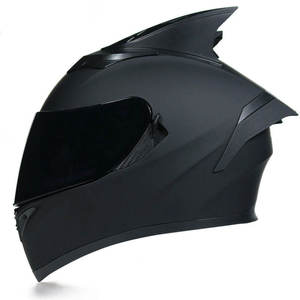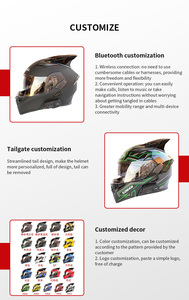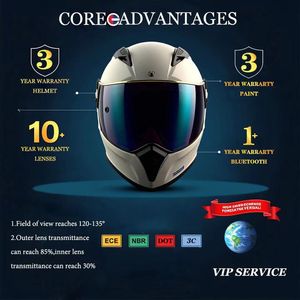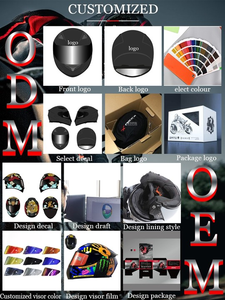(366 products available)



















































































































































































































AGV is an Italian company that manufactures a motorcycle and bicycle helmet, founded in 1947. The company name stands for Amis de la Moto, which means ""friends of the motorcycle"" in French. AGV helmets are known for their innovative design and high-quality construction, making them a popular choice among professional and amateur riders. The company sponsors many professional motorcycle racers, including MotoGP World Champion Valentino Rossi.
There are different types of AGV helmets:
Full Face AGV Helmet
The full-face AGV helmet is its name, as it covers the entire face and head. This type of helmet provides excellent protection and is suitable for high-speed riders and racers. Full-face helmets also offer good aerodynamics and reduce noise levels.
Modular AGV Helmet
The modular AGV helmet is a combination of a full-face and open-face helmet. The chin bar of this type of helmet can be flipped up, allowing the rider to switch between full-face and open-face modes. Modular helmets are convenient for touring and commuting, as they provide versatility and ease of use.
Off-Road AGV Helmet
The off-road AGV helmet is designed for motocross and off-road motorcycle riding. This type of helmet has a chin that is extended and a visor for better visibility and aerodynamics. Off-road helmets also have a larger eye port to accommodate goggles. These helmets are lightweight and well-ventilated, making them suitable for off-road conditions.
AGV Pista Helmet
The AGV Pista helmet is a high-performance racing helmet designed for professional motorcycle racing. This type of helmet is made from advanced materials such as carbon fiber for excellent strength and impact resistance. The Pista helmet has an aerodynamic design, a moisture-wicking liner, and a ventilation system to keep the rider cool at high speeds. The Pista AGV helmet also has a visor with a tear-off system for clear visibility during races.
AGV K5 Helmet
The K5 AGV helmet is a sport-touring helmet designed for riders who enjoy high-speed and touring performance. This type of helmet has a composite fiberglass shell for impact protection and a comfortable fit. The K5 helmet has a double-D ring chin strap for a secure fit and a ventilation system for internal airflow. The K5 also has an internal sun visor for UV protection and a visor with a wide field of view.
Before buying an AGV motorcycle helmet, it is essential to check the specifications. Here are the specifications to consider:
Outer shell
Bulletproof vests are made with a shell that is light and strong. It permits wearers to move freely without tiring them out. The shell is also durable and will not break easily when something hits it. This feature can prevent or lessen injury to the person wearing the vest. Bulletproof vests have shells made from various materials. These include polyester, cotton, or a mix of both.
Liner
There are layers in the helmet that protect the wearer's head. One of the layers is called the liner, which has padding or filling. The liner absorbs the hit when the person's head is struck. The liner has different materials for filling. These include foam or a mix of other materials.
Visor
The visor is a see-through part of the helmet that covers the wearer's eyes and face. It is made from plastic or glass and protects the person's face from things that may hit it. The visor also has coatings that improve what is seen through it. These coatings can stop fogging, block the sun, or prevent scratches.
Chin guard
The chin guard is a part of the helmet that covers the wearer's chin. It has padding to protect the person's chin from being hurt if something hits the helmet. The chin guard also helps the helmet fit well on the head.
Strap
The strap is what keeps the helmet on the head. It is fastened under the chin. The strap has a buckle or clip to keep it closed. This feature ensures that the helmet does not come off if something hits it.
Communication system
The communication system allows the rider to talk on the phone or with others while riding. It is an optional part of the helmet. This feature helps the rider stay connected without taking their hands off the handlebars.
AGV helmet care is essential for maintaining safety and prolonging its lifespan. Here are the dos and don'ts of AGV helmet care.
Do
- Rinse the helmet with water after every ride in the sea or sand to remove all particles.
Don't
- Use high-pressure water that can damage the helmet's coating or its parts.
Do
- Use a soft brush and mild soap to clean the helmet after every ride or at least once a week.
Don't
- Use harsh chemicals that can damage the helmet's material.
Do
- Dry the helmet with a soft cloth after cleaning or riding in the rain.
Don't
- Expose the helmet to direct sunlight for long periods, which can weaken its materials.
Do
- Check the helmet for signs of wear and replace it every five years or after a crash.
Don't
- Compromise on safety by using a second-hand helmet or one that does not meet standards.
Choosing the right AGV helmet for a business requires a comprehensive understanding of the products and the needs of the target market. Here are some key factors to consider:
Safety Standards:
Safety should always be a priority when selecting AGV helmets. Ensure that the helmets meet international safety standards, such as DOT, ECE, or Snell certifications. These certifications guarantee that the helmet has undergone rigorous testing to provide optimal protection in case of an accident.
Type of Helmet:
AGV offers various types of helmets, each designed for specific riding styles and preferences. Consider the target market's needs and preferences when choosing the helmet type. For example, full-face helmets provide maximum coverage and are ideal for sports or high-speed riders. On the other hand, modular helmets offer versatility and convenience for commuters or touring riders.
Fit and Comfort:
A proper fit is crucial for the helmet's performance and the rider's comfort. When sourcing AGV helmets, ensure you stock a range of sizes to accommodate different customers. The helmet should fit snugly without causing pressure points or discomfort. Consider features like adjustable chin straps, moisture-wicking liners, and ventilation systems to enhance comfort during rides.
Ventilation and Weather Conditions:
AGV helmets feature ventilation systems that improve airflow and keep riders cool. If the target market is in hot or humid regions, prioritize helmets with adjustable vents and breathable liners. Conversely, for colder climates, consider helmets with less ventilation to retain body heat.
Visor and Visibility:
Visibility is paramount for rider safety. AGV helmets come with visors that offer different tint options, such as clear, tinted, or photochromic. Consider the riding conditions and the target market's preferences. Additionally, ensure the visor provides a wide field of view and is scratch-resistant for durability.
Style and Design:
AGV helmets are known for their sleek designs and stylish aesthetics. Consider the helmet's color, graphics, and overall design to match the target market's style and preferences. Offering a variety of designs will attract customers looking for both safety and a fashionable appearance.
Additional Features:
AGV helmets come with various additional features that can enhance the overall riding experience. Consider features such as integrated communication systems, emergency release mechanisms, or helmet-to-bike connectivity. These advanced technologies add value and convenience for the riders.
Price and Budget:
AGV helmets are available at different price points. Determine the budget and consider the target market's willingness to spend. While prioritizing safety and quality is essential, finding a balance between features and affordability is necessary.
By considering these factors, businesses can select AGV helmets that meet customer needs, ensure rider safety, and provide comfort and style. Stay informed about the latest AGV helmet technologies and trends to offer customers the best products in the market.
Changing parts of an AGV motorbike helmet can be a straightforward do-it-yourself task. However, before attempting any repairs or replacements, always refer to the user's manual for guidance. Below are step-by-step guides on how to replace the different parts of an AGV helmet:
Q: Why are visors important in the AGV helmet?
A: The visor on an AGV helmet is essential as it provides visibility, protection, and eye comfort. It shields the eyes from debris, insects, and UV rays and is available in various tints and treatments for additional features like anti-scratch and anti-fog properties.
Q: What materials are used to make AGV helmets?
A: AGV helmets are constructed from various materials, including high-strength, impact-resistant materials like polycarbonate, fiberglass, and carbon fiber. These materials ensure the helmet remains lightweight while providing excellent protection and durability.
Q: How should the helmet be stored?
A: AGV Carbon helmet should be stored in a cool, dry place away from direct sunlight, heat sources, and chemicals. It should be kept in its original box or a helmet bag to protect it from dust and potential impacts. Storing the helmet improperly can damage it and reduce safety performance.
Q: Why is the AGV helmet so expensive?
A: AGV helmets are expensive due to their high-quality materials, advanced technology, research and development, and safety standards. They are also designed to be comfortable, durable, and stylish, making them a premium choice for riders.
Q: Can the chin strap be replaced?
A: Yes, the chin strap on an AGV helmet can be replaced. However, it is recommended to have it replaced by an authorized AGV service center or qualified professional to ensure safety and maintain the helmet's certification.
The web search volume for the keyword "agv helmet" has shown significant growth over the past year, with an average monthly web search volume of 40,500. This represents a substantial one-year increase of 123%, and even a notable three-month growth of 22%. Over the last twelve months, search activity peaked in October 2024 with 60,500 web searches, after a steady increase from February 2024, where web searches stood at 27,100.
Analyzing the trend in detail, "agv helmet" experienced fluctuations throughout the year. The web search volume dipped slightly from November 2023 to January 2024, both months recording around 22,200 web searches, before climbing steadily from February 2024. This upward trajectory culminated in the months of April to September 2024, where web search volume consistently hit 49,500, before surging to 60,500 in October 2024. This pattern suggests a seasonal influence, with peaks typically in the later months of the year.
The reasons behind these trends could be manifold, but without additional context, it is important to note the observed data. The consistent rise in web searches from spring into autumn, and the notable peak in October, could correlate with consumer behavior, possibly linked to the onset of motorcycle touring seasons in many regions, or perhaps promotional activities by manufacturers or retailers. This analysis underscores the importance of timing and external market activities in influencing consumer search behavior.